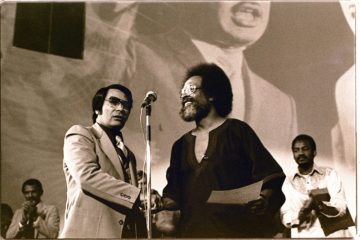Nicholas Russell at The Point:
 Jim Jones’s shadow looms large over the popular memory of Jonestown. Almost every prominent published account of the formation of Peoples Temple and the tragedy in Guyana is told through close examination of his life, often with a profound degree of sympathy. Jeff Guinn’s extensive history The Road to Jonestown chronicles Jones’s life from childhood to suicide. Raven, published in 1982 by Tim Reiterman, who was present during the Jonestown massacre, takes on a more prurient, almost fatalist tone, as if history were doomed to produce a person like Jim Jones. In true-crime podcasts, there’s no shortage of takes on what happened, but most of them revolve around the man, the myth, the legend. Narcissism, drugs, sex, abuse, manipulation, all under a veneer of altruism and nominally socialist ideals. His likeness—iconic sunglasses and sideburns—is almost cartoonish in its simplicity.
Jim Jones’s shadow looms large over the popular memory of Jonestown. Almost every prominent published account of the formation of Peoples Temple and the tragedy in Guyana is told through close examination of his life, often with a profound degree of sympathy. Jeff Guinn’s extensive history The Road to Jonestown chronicles Jones’s life from childhood to suicide. Raven, published in 1982 by Tim Reiterman, who was present during the Jonestown massacre, takes on a more prurient, almost fatalist tone, as if history were doomed to produce a person like Jim Jones. In true-crime podcasts, there’s no shortage of takes on what happened, but most of them revolve around the man, the myth, the legend. Narcissism, drugs, sex, abuse, manipulation, all under a veneer of altruism and nominally socialist ideals. His likeness—iconic sunglasses and sideburns—is almost cartoonish in its simplicity.
Beneath all of this lies what usually gets left out of the story: Jones’s peculiar fixation on and identification with black people, which metastasized to the point of delusion.
more here.
